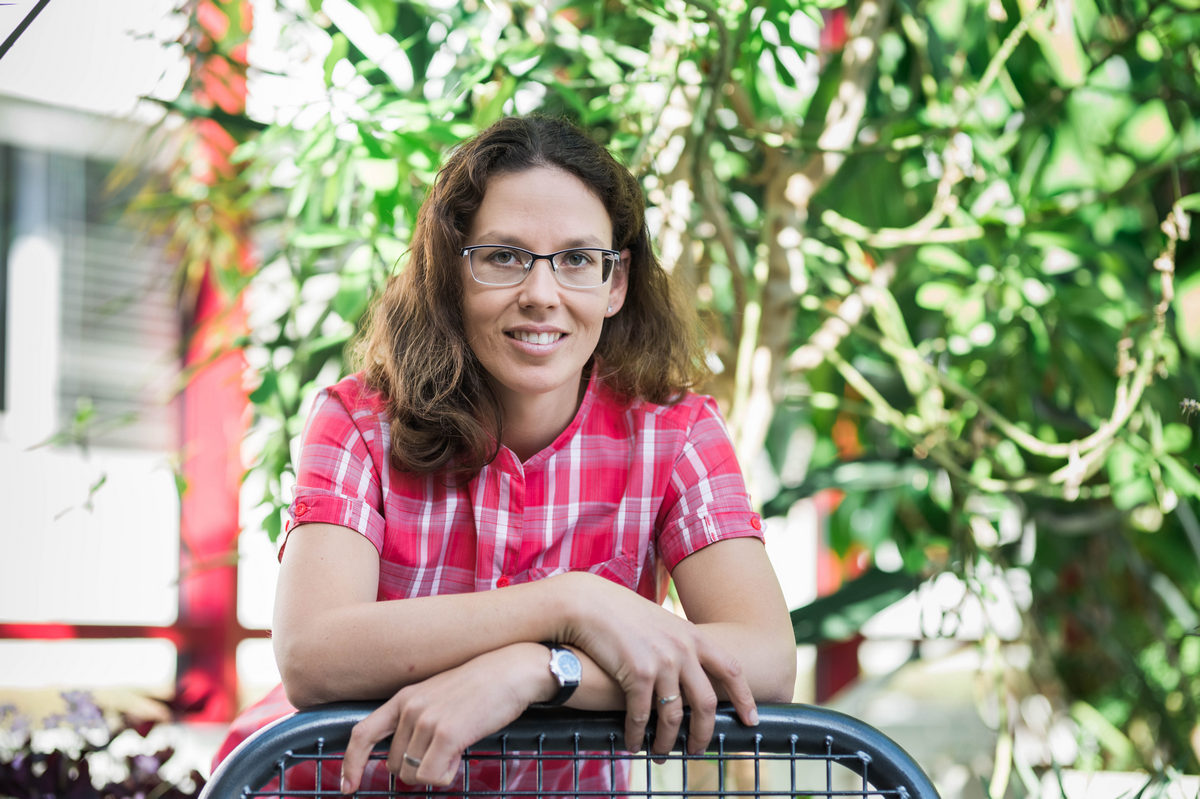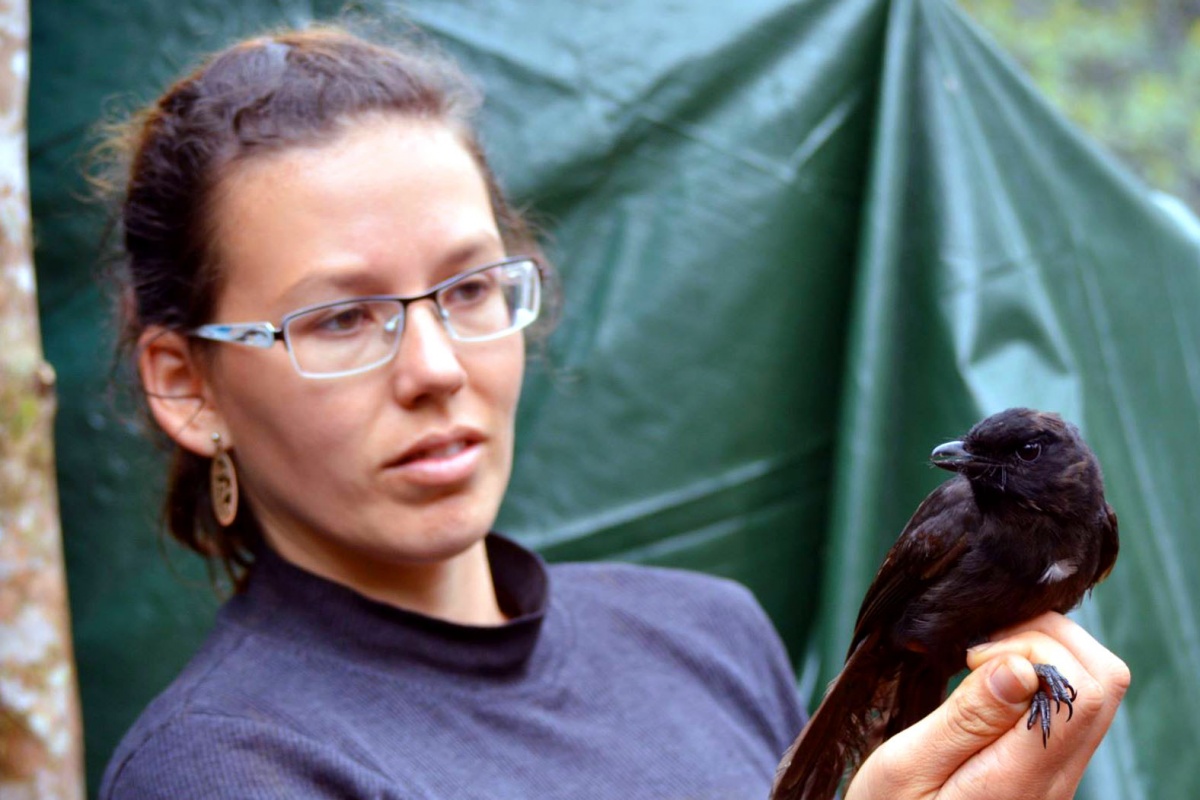
In 2017, she returned to České Budějovice to head the Laboratory of Multitrophic Interactions at the Institute of Entomology of the Biology Centre of the Czech Academy of Sciences. At the same time, she was awarded the Martina Roeselová Memorial Fellowship. A year later, she won a prestigious ERC Starting Grant. In her research, she focuses on topics in zoology, ecology, and behavioral ecology. She has one child and is expecting a second.
You head your own laboratory at the Biology Centre of the Czech Academy of Sciences in České Budějovice. What are you working on?
I examine various aspects of communication between plants and insects and their predators. In particular, my students look at whether birds are capable of detecting an insect on a plant with the help of the volatile substances that plants produce when they’re attacked by insects, or if it’s because of the way herbivorous insects react to the presence of birds and spiders, as well as to indirect signs of them, on plants. In large projects, we research the pressure put on insects by predators and what effect it has on plant associations or fitness. At the moment, I’ve got large projects like that underway in Japan, China, Malaysia, Papua New Guinea, Australia, and South Africa.
During your postdoctoral studies, a time when scientists are usually concentrating on their career, you started a family. It seems, though, that it didn’t slow you down a whole lot. You managed to make a name for yourself, and in the end, you received an offer to return to the Czech Republic to head your own laboratory. The very next year you won an ERC Starting Grant. How do you combine motherhood with a successful career in science?
A calendar and various personal organizers have become an inseparable part of my life. Just as I know what I’ll be doing at 2 p.m. the day after tomorrow, I also know what drawer in the freezer to go to for the 100 grams of celery I’ll need in an hour for the lasagna I’m making for dinner. Records of what equipment I have in which countries, which student is flying in on what day, and where and by when I have to submit an application for research permits have, quite simply, become nearly as important as an appointment to have my dog vaccinated or a list of the contents of the various drawers in my freezer. Disorder became my arch enemy. One time, they came into my office to photograph me for a daily newspaper. When the photographer saw my desk, he said it didn’t look very scientific, kind of untrustworthy and tidy, so he asked me if I would mind having my photograph taken at my student’s desk, which was in a state of complete chaos.
It sounds as though you don’t have much time left for your own research.
Yes, truth be told, I feel I’m more of a manager than a scientist. I currently have nine doctoral students, three younger ones, and another eight employees. In addition to that, I’m the deputy head of a department with another 50 or so employees. And when you have half of your students coming to you each day with a question and you throw in a couple of organizational matters in the field, some permits that are taking forever, visas, outstanding payments, then I don’t get to sit down to my scientific work until about 3 p.m.
That’s why I had to learn very quickly how to be very efficient and deal with the fact that I have eight work hours each day, and I have to fit everything into that time. I can’t afford to spend several hours writing a paragraph anymore. Now, I simply sit down and have to have a whole first draft of an article ready in a single day. So, each morning, I review my plan and decide how much time I’d like to spend on what. I set aside time for disasters and unexpected meetings with students, and I also plan out what I need to manage on the way home from work, at home in the garden, what to make for dinner, and from there I just go non-stop. Of course, accidents do happen, which is why I no longer give a second thought to mothers in the supermarket right before midnight looking for that white shirt for tomorrow’s school performance. I’ve also lost track of how many abstracts and grant reports have, in the best-case scenario, been sent out one minute before the deadline.
In 2017, you were awarded a Martina Roeselová Memorial Fellowship. How exactly has the grant helped you?
It allowed me to take my son with me to conferences, into the field, get him a babysitter on the days he couldn’t come with me into the rainforest. Because I got to take him with me for, say, even two months to Australia or Papua New Guinea, I was able to save myself a lot of organizational problems and emotional ones too. It seems to me, really, that in order for a Czech mother to find approval among those around her, she has to sit at home on her butt with her child for three years. Should she decide to put the child in daycare, she’s neglecting him. And if she takes the child with her to work or into the field, then she’s putting his life in danger. I found that “putting his life in danger” worked best for me, and I think my son had a pretty good time too. The fellowship was a great help in making it all possible financially.

What do you think in general about the scientist-mother situation in the Czech Republic?
I came back from Australia to Czechia precisely because I think the situation here is considerably better than in a lot of other countries. Especially at our institute, I feel very good. I’ve never encountered any form of discrimination here. On the contrary, I’d say. I can choose from two preschools right here on campus, and they both take kids from one year of age. I think it’s nice that no one considers it out of the ordinary for a woman to decide to have a child during her doctoral or postdoctoral studies, when she’s almost 30 years old anyway.
In Australia, which was where I did my post-doc, I didn’t feel that way. My son was one or two years old, and everyone was looking at me like I’d lost my mind, like I was ruining my career and my life. Supposedly, not even one of my female colleagues there can afford a family yet, and they’re all around 35 years old. There was no preschool on campus, and the private ones were too expensive. After having a baby and staying at home with it for a number of weeks, women are expected to go back to work full time. I worked two whole years with a child on my hands, and I must say that I almost had a nervous breakdown. I was unable in those two years to find a different job, a part-time one.
That’s why I didn’t hesitate for a minute when the offer came to return to the Czech Republic. Luckily, my husband was pretty easy to convince too. Here, nobody considers it a problem when they suddenly send my son home with chicken pox and I announce that I’ll be working from home for the next few days. But I’m sure that’s not the way things work everywhere. I often hear complaints from mothers at various institutes in Prague about how they don’t have institutionalized preschools. I also have the huge advantage of working in ecology, where you can do a lot of your experiments with a child. I think mothers working in labs, for instance, are in a much tougher position.
Nonetheless, I still feel that the greatest enemy to Czech women scientists are the other women around them. Lots of women still think that being home with a child for three to four years is the right way and the only way. As soon as a mother decides for an early return to employment, she’s often indiscriminately and unsparingly criticized. For me personally, discussions about how to make it possible for women to return to the labor market more quickly are far more important than debates about how to increase the child benefit.
Your family is going to be getting bigger soon. What other plans, both family and professional, do you have?
Survive. :-) Unfortunately, in the past few years I became the mother of several little angels, so now we’re truly hoping for the arrival this autumn of a healthy baby. Things will probably be rather lively for us at home, but I’m slowly getting my students accustomed to independence and my absence. Just recently, for instance, I attended six conferences in six weeks and came back to a team that was working on its own, more or less. Despite that, I am planning on finding a helper, because I simply won’t be able to leave ongoing projects on the back burner for too long. I also want to get back to my students soon. We’ve brought them to the Czech Republic from China, Malaysia, Papua New Guinea, Colombia, and India. I feel responsible for them, because for the next four years they’ve sort of become a part of my family. So, I’ll probably rest a bit over Christmas, and then in February I’ll be getting my teams out in the field, and in March I’ll most likely begin writing a new research project, because I need to secure financing for 2020 for several of my former employees and students. In recent years, I’ve been quite taken by the relationships between spiders and birds, so I look forward to writing about that and doing research on it. Nevertheless, my ERC project is going to take four years yet, so there will be no lack of distractions and problems in any of the six countries we’re working in.
First published on 20 December 2019 on the Martina Roeselová Foundation website
Photos: Pavlína Jáchimová / Czech Academy of Sciences; Kateřina Sam's archive